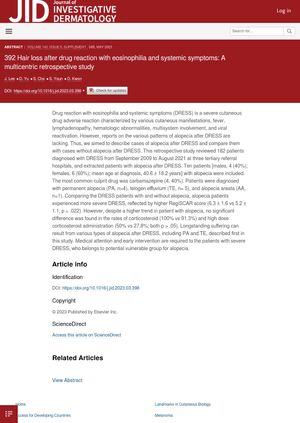Hair Loss After Drug Reaction With Eosinophilia and Systemic Symptoms: A Multicentric Retrospective Study
April 2023
in “
Journal of Investigative Dermatology
”

TLDR Some patients who had a severe drug reaction developed long-term hair loss.
The retrospective study reviewed 182 patients diagnosed with Drug Reaction with Eosinophilia and Systemic Symptoms (DRESS) from 2009 to 2021, and found 10 patients (4 males, 6 females, mean age 40.6 years) who developed alopecia after DRESS. The most common drug causing DRESS was carbamazepine (40% of cases). The types of alopecia diagnosed were permanent alopecia (4 patients), telogen effluvium (5 patients), and alopecia areata (1 patient). Patients with alopecia had more severe DRESS, as indicated by a higher RegiSCAR score (6.3 vs 5.2, p = .022). However, there was no significant difference in the rates of corticosteroid and high dose corticosteroid administration between patients with and without alopecia. The study concludes that alopecia can be a long-term consequence of DRESS, and early intervention is needed for patients with severe DRESS who are at risk of developing alopecia.

